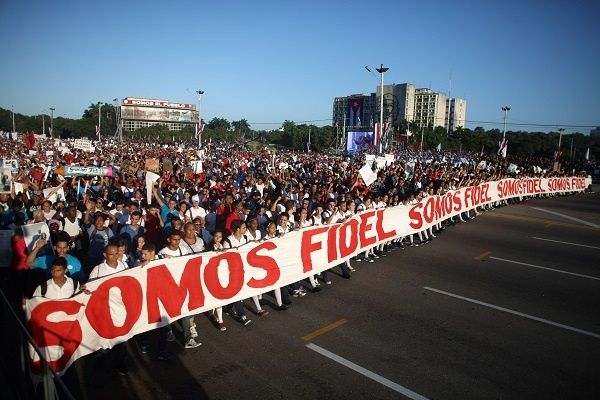NOVANEWS
Cuba celebrated 60 years Monday since the launch of its revolution in 1956, the first anniversary without late former president and revolutionary leader Fidel Castro, with a military parade and march of hundreds of thousands of citizens in Havana’s iconic Revolution Square.
ANALYSIS: After Fidel, What to Watch Out For in Cuba in 2017
The Cuban military, workers, students, children and youth joined in the events, one day after the country commemorated the anniversary of the occasion when Fidel Castro claimed victory for the Cuban revolution on Jan. 1, 1959, after dictator Fulgencio Batista fled Havana.
The march brought together a range of symbols representing Cuba’s long struggle for independence and sovereignty, beginning with a cavalry parade to represent the liberation struggle against Spanish colonization.

Another part of the parade featured a replica of the Granma yacht — on which Fidel and his revolutionary troops sailed to Cuba from Mexico in 1956 to launch the uprising against the Batista regime — symbolically “floating” on a sea of Cuban children adorned with blue. The island marked 60 years in 2016 since Granma arrived on Cuba’s shores on Dec. 2, 1956 with Fidel and Raul Castro, Ernesto “Che” Guevara, Camilo Cienfuegos and other revolutionary troops onboard.
Cuba holds the military and civilian parade every five years on Dec. 2 to celebrate the anniversary of the Granma landing, but this year it was postponed to observe nine days of national mourning after Fidel Castro’s death on Nov. 25 at the age of 90.
RELATED: Cuba Will Not Go Toward Capitalism Now or Ever: Raul Castro
Cuban soldiers, workers, students and crowds of other supporters followed in the march amid chants of “We are all Fidel, Fidel is the people!” and “Revolution is building!”
The day of anniversary celebrations in Havana’s Revolution Square comes just weeks after tens of thousands of Cubans filled the plaza to pay their last respects Fidel Castro, before his ashes departed for a cross-country tour to be interred Dec. 4 alongside independence leader Jose Marti and other national heroes in Santiago de Cuba.
The anniversary of the revolution also comes just weeks ahead of the inauguration of U.S. President-elect Donald Trump, whose win in the Nov. 12 elections has cast a shadow of uncertainty over the future of the normalization of U.S.-Cuba ties, in progress for the past two years.
During Monday morning’s events, youth leader Jennifer Bello, a member of Cuba’s Council of State and president of the University Student Federation, recognized the strength of the Cuban people in driving forward both revolutionary struggle and the thawing of ties with the U.S.
“Cuba is not going to give up a single one of its principles,” she said, according to Cuba Debate.
“We would not have reached this process without the resistance of the Cuban people,” she added, referring to the progress toward normalization of U.S.-Cuba relations.
After negotiations, on Dec. 17, 2014, Cuban President Raul Castro and U.S. President Barack Obama announced plans to re-establish long-frozen relations between the two countries. In July 2015, the countries reopened their foreign embassies in Havana and Washington after more than half a century, and in March 2016, Obama became the first sitting U.S. president to visit Cuba since 1928.
OPINION: The World Must Learn From Cuba
These and other developments, including the launch of commercial flights from the U.S. mainland to Cuba and several other historic changes, have marked landmark reforms in U.S. policy toward Cuba and bilateral ties between the two nations.
However, Cuba maintains that the normalization of ties will not be complete until the United States lifts the financial, commercial and economic blockade against the island, closes down the U.S. military base at Guantanamo and commits to fully respecting Cuban sovereignty.
But Trump has demonstrated hostility toward Cuba and rejected the thawing of ties, claiming that the normalization process should be scrapped unless Havana agrees to a better “deal.”
Despite the many changes — combined with uncertainty under a Trump White House — Raul Castro has reaffirmed that the socialist country will never head toward capitalism.



